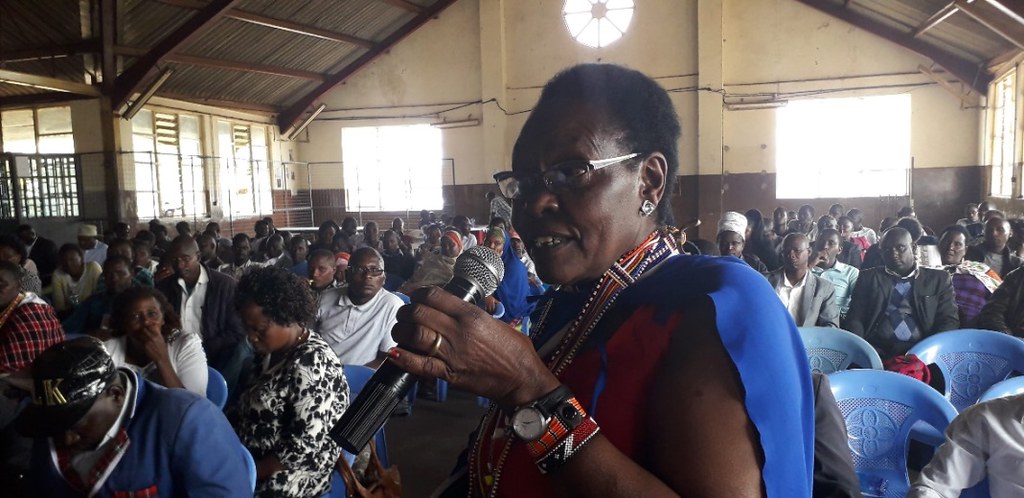Watershed empowering citizens was a unique programme focused on advocacy and influencing. After 5 years, what have we learned?

Published on: 01/02/2021
Photo: Kenya - Budget Champion Penina Tombo at a public participation forum. Credit: Jacob A. Baraza/Watershed
It is 2021. How are we doing in delivering the Human Right to Water and Sanitation? How close are we to meeting the Sustainable Development Goal 6 targets? Not yet close enough, especially for sanitation in non-urban settings and for all the targets related to the management of water and wastewater. Inequalities in access to water and sanitation are also increasing in many countries.
Access to water and sanitation is largely a non-ideological issue. Unlike other human rights, you will not be killed or silenced when asking for better services. Almost everyone agrees that it is ultimately a government responsibility to ensure adequate services (independently of who provides the services in the end).
Because of its non-ideological nature, water and sanitation is a space where it is easier than some to seek collaboration between governments, service providers and civil society. A 5 year programme that focused on engagement of civil society in the water sector has proven that CSOs can speed up access to services, leaving no one behind.
Watershed Empowering Citizens, which is just ending, was one of the largest programmes funded for NGOs and CSOs focused on advocacy and influencing of water, sanitation and water resources management. After 5 years, what have we learned?
That citizens are empowered when they know the status of their water and sanitation services, when they know who to discuss them with, when they know how to influence improvements in public services and when they break out of sector silos. That they are a powerful force in development and can change laws, policies and practices that impact the quality of water available to millions of people. The Watershed-supported CSOs have contributed, both directly and indirectly, to 90 local and national government policy changes across 7 countries.
Many of the changes related to WASH budgeting. In Mali, the National Assembly doubled the WASH budget between 2017 and 2019. In Kenya, Kajiado sub-county water officers began uploading live updates of public expenditure tracking (using Akvo tools). In Bangladesh, Union Parishads allocated separate WASH budgets for women and persons living with disabilities. The speed of budget allocation changes seen in Watershed has been faster and larger than many development programmes focused on “increasing finance for the sector”.
Successes of civil society organisations supported by Watershed revolved around drawing on the power of voice to increase social inclusion; developing the skills to track and influence budget allocation; inspiring other CSOs to action; enabling constructive dialogues with government; and using advocacy to change policies.
Outcomes include more space for civic engagement, more accountability and sustainability of service delivery and better services for the marginalised. The 512 outcomes of the programme tracked across multiple areas demonstrate that CSOs and NGOs are more than implementing arms of the government for the sector. That if given access to the right tools they can be a motor for development, bringing together the best of the top-down planning approach of most agencies in the sector with bottom-up accountability and faster changes.
The legacy of the programme includes more than 100 knowledge products for different audiences, an online training course on developing an advocacy strategy and a larger campaign #VoicesforWater targeting other CSOs and encouraging them to engage with the water sector.
In 2020 CIVICUS reported that only 3.4% of the world population lived in countries with a civic space characterised as ‘open’ and many countries moved their status to repressed (43.4%) or closed (25.4%). The COVID-19 pandemic made the work of civil society harder requiring new skills and rethinking strategies for engaging with governments and citizens.
The Watershed programme has come to an end, but with much still to be done, how do we ensure funding for the CSOs to continue their work of advocating for the SDG 6 targets, for the human right to water and sanitation?
There is plenty of work for CSOs and NGOs but there are very limited funds available and few programmes to ensure survival of local CSOs and citizen groups: in fact they are almost non-existent in the water and sanitation sector. Local water sector NGOs are increasingly dependent on government (infrastructure) contracts for survival which then encourages them to work as contractors and puts them in a difficult position to hold governments accountable, let alone demand for transparency and apply checks and balances. To make matters worse, post-COVID recovery funding has been allocated to economic recovery, small and medium enterprises and health programmes. WASH is at bottom of the list yet strong CSOs working in the water sector are needed now more than ever.
Many bilateral agencies and donors have a voice in shaping the sector and fund large programmes with a multitude of stakeholders. Too often, however, these do not include civil society organisations. There is a large untapped opportunity in the SDG 6 agenda of these agencies, in their strategic frameworks and annual plans to address civic space, Watershed shows that doing so is not just worthy, but also effective.
At IRC we have strong opinions and we value honest and frank discussion, so you won't be surprised to hear that not all the opinions on this site represent our official policy.